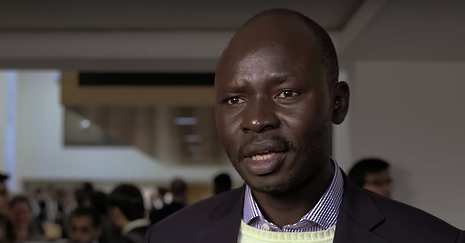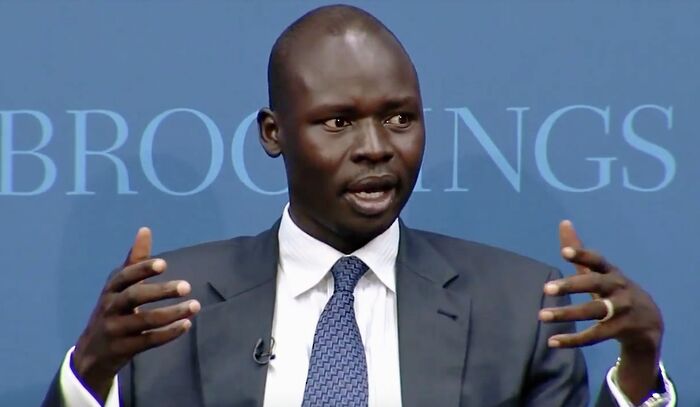Cambridge PhD student Peter Biar Ajak charged with sabotage and insurgency
Ajak and six others have been charged with sabotage, insurgency and possession of weapons for an alleged October uprising which has nothing to do with their initial arrests

Peter Biar Ajak, a Cambridge University PhD student who has been detained in a South Sudan prison since last July, was charged on Monday with sabotage, insurgency and possession of weapons, along with six others, all of whom have pled not guilty.
According to a report by the Associated Press, the charges have been brought forward by South Sudan’s National Security Service (NSS), and relate to an alleged prison uprising by other detainees in October 2018 in South Sudan’s main national security prison, the “Blue House”. The charges carry possible death penalty if the accused are found guilty.
Jared Genser, an international human rights lawyer who took on Ajak’s case, called the recent charges “unequivocally false”, telling Newsweek that his client “was not involved in any way in the planning or execution of the protest.”
Ajak was originally detained by the NSS at Juba International Airport on 28th July 2018, and has still not been formally charged for anything relating to this initial arrest eight months ago.
Ajak had been an outspoken critic of the South Sudanese government’s response to the country’s ongoing civil war. He is a chairperson of the South Sudan Young Leaders Forum, and was arrested while on the way to an event held by the Red Army Foundation, an organisation created by former child soldiers to advocate for peace and address social issues in the country.
Shortly before his arrest Ajak had tweeted that: “We must stop thinking that the so-called leaders will bring peace #SouthSudan. We, the great people of #southsudan, must organize ourselves to bring about the peace we deserve!”
Over the past few months there has been mounting international pressure on the South Sudanese government to release Ajak and others who have been similarly detained. Detaining a person without charge for more than 24 hours is illegal under the South Sudanese constitution.
The United Nations condemned Ajak’s continued detention earlier this month, citing a “clear trend in the use of national security and counter-terrorism legislation by states to criminalize free expression and the legitimate work of human rights defenders.”
On the news of the charges brought against Ajak, a University of Cambridge spokesperson told Varsity: “The University remains deeply concerned about the welfare of Peter Biar Ajak... The University continues to monitor the situation in South Sudan closely, and calls for Peter's due process rights to be respected. We are in contact with Peter's family and are receiving regular updates.”
In September 2018, Vice-Chancellor Stephen Toope wrote a letter to the President of the Republic of South Sudan stating that the University “call[s] on the government to either release Peter Biar Ajak, or to bring charges against him in a timely manner in accordance with the rule of law and to grant him access to a lawyer.” Ajak’s cause has also been championed by international human rights organisation Amnesty International.
Cambridge University Amnesty International told Varsity: “We find Peter’s charges to be completely unjust for a man who stood up for so many, and advocated human rights and protected political speech. To be charged with terrorism, despite working to try and promote the development of his country, is completely wrong. Cambridge University Amnesty International will continue to fight for Peter’s freedom through working with those closest to Peter and keeping up pressure and attention on Peter’s case.”
Earlier this month, members of Cambridge University Amnesty International protested Ajak’s arbitrary detention by camping out in a wooden cage on King’s Parade for two days.
Two more hearings are scheduled for later this week.
This article was updated Thursday 28th March 14:51 to add a comment from the University of Cambridge, and at 18:02 to add a comment from Cambridge University Amnesty International.
 Interviews / Lord Leggatt on becoming a Supreme Court Justice21 January 2026
Interviews / Lord Leggatt on becoming a Supreme Court Justice21 January 2026 Features / Are you more yourself at Cambridge or away from it? 27 January 2026
Features / Are you more yourself at Cambridge or away from it? 27 January 2026 News / Reform candidate retracts claim of being Cambridge alum 26 January 2026
News / Reform candidate retracts claim of being Cambridge alum 26 January 2026 News / Report suggests Cambridge the hardest place to get a first in the country23 January 2026
News / Report suggests Cambridge the hardest place to get a first in the country23 January 2026 News / Cambridge psychologist to co-lead study on the impact of social media on adolescent mental health26 January 2026
News / Cambridge psychologist to co-lead study on the impact of social media on adolescent mental health26 January 2026










